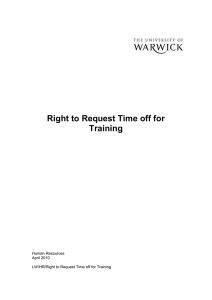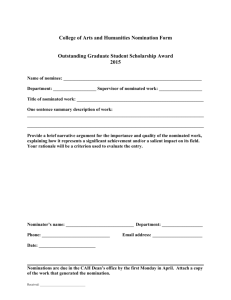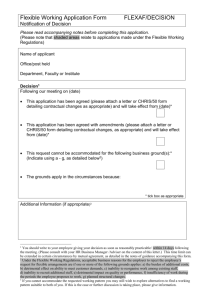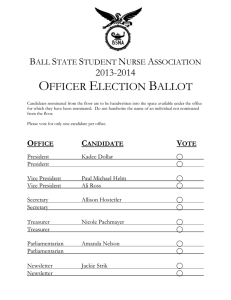Guidelines on Flexible Working. Human Resources Updated September 2014
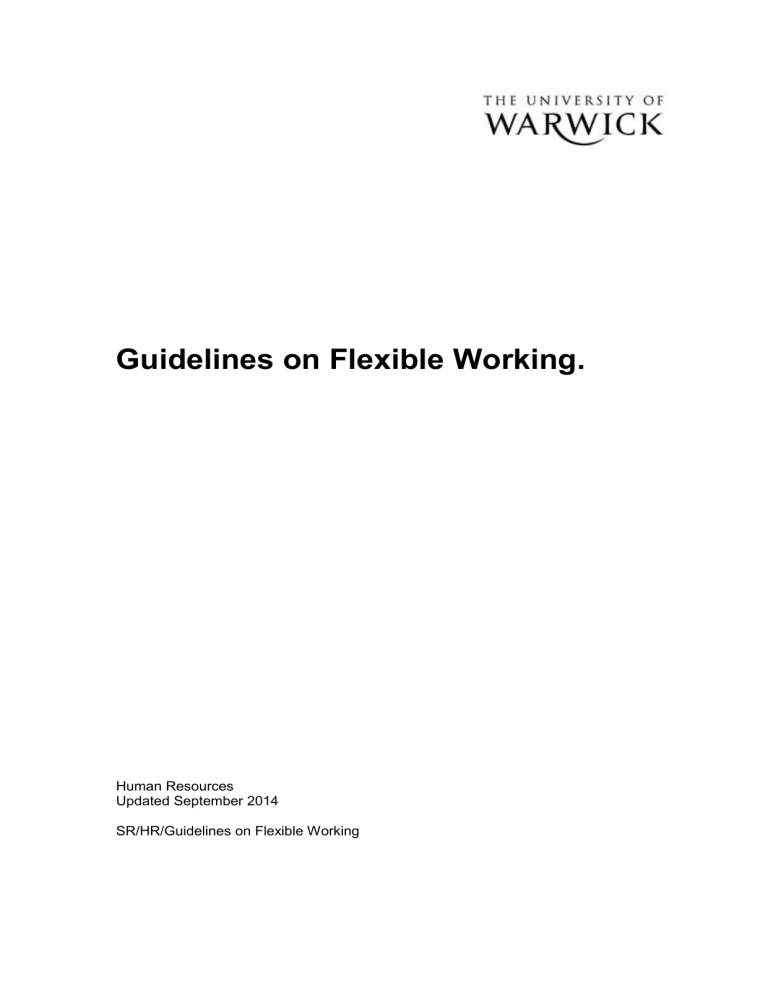
Guidelines on Flexible Working.
Human Resources
Updated September 2014
SR/HR/Guidelines on Flexible Working
1.0 INTRODUCTION
1.1 The University recognises the benefits of a flexible workforce in terms of recruitment, retention and performance of staff. These guidelines are intended to outline legislative requirements and to assist employees at the
University to balance their work and personal lives via a range of possible flexible working arrangements.
2.0 PRINCIPLES
2.1 The following principles will apply for all requests relating to flexible working:
opportunity and fairness - all employees with 26 weeks’ service have the statutory right to request flexible working.
t he University’s business needs - all requests will be assessed in line with the University’s and the Department’s business/operational needs.
Managers should, where appropriate, consult colleagues and other employees who may be affected by the request before the decision is confirmed, whilst maintaining confidentiality concerning any personal information.
avoiding unlawful discrimination in considering business needs the
Head of Department (or nominated representative) must ensure no inadvertent discrimination occurs relating to any personal protected characteristics as outlined in the Equality Act 2010 1 . This could, for example, include where a flexible working arrangement would be a reasonable adjustment for an employee with a disability, or an employee with childcare responsibilities.
co-operation and understanding - employees and managers should work together to achieve the best outcome from any request for flexibility, taking into account any potential impact on the University ’s and
Department’s business needs.
3.0 FLEXIBLE WORKING OPTIONS
3.1 There are seven basic options shown below, but other requests may be considered:
3.1.1 Unpaid leave - a period of unpaid time off work may be agreed, usually between one week and one year. Employees should not work elsewhere outside the University during unpaid leave unless agreed in advance. It is anticipated that employees will normally return to their existing post and any authorised unpaid absence will count towards continuous service.
3.1.2 Reduced hours - reduced hours of work may be agreed, either temporarily
(usually for a period up to one year) or on a permanent basis.
1 The personal protected characteristics are: age, disability, gender reassignment, marriage and civil partnership, pregnancy and maternity, race, religion or belief, sex and sexual orientation
Guidelines on Flexible Working
2
3.1.3 Seasonal hours/term time only working – a seasonal hours contract provides the opportunity to work shorter hours at certain times of year and longer hours during the rest of the year. Term time only working may coincide with
University term times or school term times.
3.1.4 Staggered hours – working staggered hours means that although employees would work fixed hours every day, the start, finish and lunch times could be amended to suit personal needs.
3.1.5
Flexitime – flexible working hours schemes are supported by the University where they meet the needs of employees and departmental needs. Any scheme should be discussed fully with employees, applied consistently and need to incorporate breaks and core times.
3.1.6 Job-sharing – many job roles involve a range of duties which could be shared by two or more people, and job-sharing can be considered for operation at all levels and for all categories of staff. Job-sharing is usually achieved by splitting days or weeks.
3.1.7 Compressed hours – working existing hours but over a shorter working week or fortnight (options include a 4.5 day week and a 9 day fortnight).
3.1.8 Homeworking
– occasionally, roles may be suitable for employees to be fully based from home and this will be outlined in the employee’s contract of employment. More usually, employees may work from home for a short period of time to complete a specific project. There are a number of issues to be considered, including health and safety, insurance requirements, access to computer facilities, and the costs of telephone calls, printing, electricity etc.
3.2 Considerations - when reviewing any flexible working requests there are a number of considerations to be taken into account:
whether and how the pattern of work can be adapted
how current workloads will be covered
how staff on long periods of absence will be updated on developments in the Department
how staff on long periods of absence can access training updates
4.0 FORM OF APPLICATION
4.1 Employees may make one application a year in writing. If the application is accepted it will normally lead to a permanent change to the employee’s terms and conditions of employment, unless expressly agreed otherwise with the employee making the request. The application should be signed, dated and submitted to the Head of Department (or nominated representative), with a copy sent to the link HR Adviser. The application should specify:
that it is a statutory request for flexible working and if and when they have made a previous application for flexible working
Guidelines on Flexible Working
3
the proposed flexible working pattern and requested date of change
what effect, if any, the employee thinks the proposed change would have on the Department and how, in their opinion, any such effect might be addressed
if the application is being made in relation to the Equality Act 2010, for example as a reasonable adjustment for a disability, or in relation to other personal protected characteristics.
4.2 Further details on making an applicatio n can be found on the government’s website at the link below: http://www.direct.gov.uk/en/Employment/Employees/Flexibleworking/DG_100
37051
5.0 THE APPLICATION PROCESS
5.1 Legislation requires that all requests, including any appeals, must be considered and decided upon within a period of three months from the receipt of the written request for flexible working. This three month period may be extended by agreement with the employee.
5.2 If the Head of Department (or nominated representative) approves the request it is not necessary to arrange a meeting to discuss the request.
However, it is important to discuss the impact of any changes in relation to the employee ’s role, and to seek to ensure that the proposal put forward is the best solution for both the employee and the University.
5.3 If the Head of Department (or nominated representative) needs to further understand the request they should write to the employee with a proposed time and date to discuss the request. The employee must be advised that they may be accompanied by a trade union representative or a work colleague. The purpose of a meeting is to explore the desired working pattern, any benefits of the changes for the employee and the department, and any potential adverse business impact of implementing the changes. In considering the request managers must ensure that they do not discriminate unlawfully against the employee (for example in relation to any of the personal protected characteristics as outlined in the Equality Act 2010).
5.4 There is no requirement for a face to face meeting and the discussion may take place on the telephone where appropriate.
5.5 If the employee fails to attend a meeting or any subsequent, rescheduled meeting the flexible working request can be deemed to have been withdrawn, and no further request can be submitted until 12 months have elapsed since the flexible working request submission. The employee must be notified of this in writing.
5.6
Within 15 working days of the date of the meeting the Head of Department (or nominated representative) must write to the employee either:
Guidelines on Flexible Working
4
(a) accepting the request and confirming the start date
(b) confirming any amendments to the request which have been agreed with the employee, or which are proposed for consideration by the employee
(c) confirming any trial period duration and thus the postponement of the final decision date on the application
(d) rejecting the application on the basis of one of the eight business grounds( please see 5.7)
If more time is needed to explore the request the Head of Department (or nominated representative) may propose an extension of time which must be agreed with the employee and confirmed in writing.
All correspondence to the employee must be signed and dated.
5.7 The Head of Department (or nominated representative), if they decide to reject the employee’s application, should discuss the reasons with the department’s link HR Adviser prior to any communication of the decision to the employee. If an employee has a personal protected characteristic under the Equality Act, the decision to turn down the request must be a proportionate means of achieving a legitimate aim. Rejection of a request must relate to one of the following business grounds:
the burden of additional costs
a detrimental effect on ability to meet customer demand
an inability to re-organise work among existing staff
an inability to recruit additional staff
a detrimental impact on quality
a detrimental impact on performance
an insufficiency of work during the periods the employee proposes to work
any future planned structural changes
5.8 If an application and any subsequent appeal are unsuccessful a further flexible working request may not be submitted until 12 months after the submission date of the flexible working request.
6.0 APPEAL PROCESS
6.1 If the employee wishes to appeal they must do so within 10 working days of receiving the written notification that their request has been rejected. The appeal should be submitted to the next level of seniority to the manager who made the original decision on the flexible working request. The appeal meeting will be arranged within 15 working days of receipt of the appeal. The employee may be accompanied at the appeal meeting by a trade union representative or a work colleague.
6.2 The only valid grounds for rejection of any appeal must relate to at least one of the eight business grounds (please see 5.7).
6.3 If the appeal is rejected the employee will receive notification in writing of the reasons the appeal has not been successful. This letter must be sent within 3 months of receipt of the original flexible working request from the employee.
Guidelines on Flexible Working
5
7.0 KEY CONSIDERATIONS
7.1 An option to consider is the implementation of a trial period to determine operational viability of the proposed amendment(s) to the working pattern. A trial period needs to provide sufficient time to assess any impact of the amended working pattern, and would normally be for at least a 2 month period. If a trial period is agreed a temporary amendment to contract must be confirmed in writing, which will stipulate that the amendment is for a trial period which may be extended or ended early by the Head of Department (or nominated representative) where appropriate. The final decision on the flexible working request will be postponed until the end of the trial period, and this must be documented in writing. Review dates should be included within the trial period.
7.2 There may be occasions when a number of employees submit a request to work flexibly. Requests should be considered in the order they are received.
Having considered and approved any requests the business context will have changed and can be taken into account when considering any further flexible working requests. The Head of Department (or nominated representative) is not required to make a value judgment about the most deserving request, but must consider the business grounds and any potential impact of refusing a request. In considering business needs the Head of Department (or nominated representative) must ensure no inadvertent discrimination occurs relating to any personal protected characteristics as outlined in the Equality
Act 2010.
7.3 All changes to contracted hours will need to be confirmed by University
Human Resources following submission of a request to amend form by the
Department.
8.0 FURTHER INFORMATION AND ADVICE
8.1 Advice may be sought from link HR Advisers on any aspect of these guidelines. If the Head of Department (or nominated representative) intends to reject the request contact should be made with the departme nt’s link HR
Adviser in advance of notification to the employee.
Guidelines on Flexible Working
6
